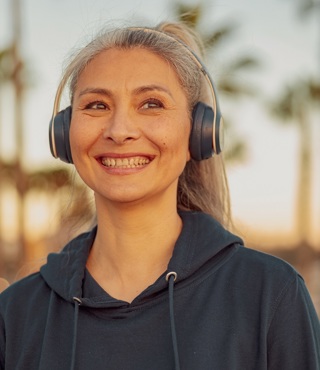
Our top five tips to protect your hearing
Your hearing is precious. It’s a vital sense that not only helps keep you safe and alert but also gives you the chance to enjoy the rich world around you — from the dawn chorus to your favourite TV show. It’s also a delicate sense that can diminish over time and through certain situations. This is why hearing care is so important.
Our top five tips to protect your hearing
Your hearing is precious. It’s a vital sense that not only helps keep you safe and alert but also gives you the chance to enjoy the rich world around you — from the dawn chorus to your favourite TV show. It’s also a delicate sense that can diminish over time and through certain situations. This is why hearing care is so important.
Whether you work in a loud environment or just want to know how to best look after your ears, read on for our top tips on protecting your hearing.
Can loud sounds cause hearing loss?
Hearing loss can occur for lots of reasons. For many, hearing loss can simply develop with age. Known as ‘presbycusis’, age-related hearing loss tends to affect those over 60, due to changes to the ear structure as we get older.
Ear wax build-up can also affect your hearing — but this is usually a temporary issue you can treat with ear wax removal.
So, what about noise exposure? One of the most common causes of hearing loss is, indeed, exposure to loud noises — also referred to as ‘noise-induced hearing loss’ (NIHL). This can happen over time or suddenly, depending on the sounds you’ve been exposed to.
How to protect your hearing
In a loud and busy world, it’s tricky to eradicate the risk of hearing loss but there are some actions you can take to protect your ears and hearing as best as possible.
1. Use ear protection
Do you work in a noisy environment, playing gigs or using loud machinery? If so, using ear protection is one of the best ways to keep your hearing in top condition.
So whether you’re mowing the lawn, riding a motorcycle, working at a construction site, or playing an instrument, wearing ear plugs or ear defender ear muffs can make a real difference — they can protect your hearing from long-term damage.
And if you’re not sure whether your workplace exposes you to unsafe noise levels, take a look at the HSE noise exposure calculator.
2. Limit your exposure to loud sounds
It’s also wise to limit how much time you spend in loud environments where possible. For instance, turn the volume down on your TV if it sounds too loud and keep an eye on the volume level when using headphones or earbuds. A good way to monitor this is to follow the ‘60/60’ rule — make sure the volume is no higher than 60% of its maximum and only listen for 60 minutes at a time.
Try to take breaks from being in the midst of loud spaces, too — if you’re at a festival or in a loud shopping centre, find quieter areas to let your ears reset for a short period.
3. Take a break after exposure to loud noises
Similarly, it’s a wise idea to get some peace and quiet after being in a loud space. Have you ever noticed your ears ringing after attending a concert or being in a big crowd? This is known as a temporary threshold shift and is your ears' way of protecting themselves against noise damage. After being at a loud event, try to take a day with minimal noise exposure to help your hearing settle and recover.
4. Avoid using cotton buds in your ears
It can be tempting to use cotton buds or similar tools to clean your ears, especially if you have a build-up of wax. However, doing this can run the risk of damaging your eardrum or ear canal. Instead, gently clean your ears with a washcloth and always see a professional audiologist for ear wax removal. The old saying of never putting anything smaller than your elbow into your ears is a good guide to avoiding accidental damage.
5. Get regular hearing tests
Hearing tests can identify hearing loss and help you find the right solution for your needs. If you’ve noticed any hearing loss symptoms, it’s always a good idea to get it checked.
If you work in loud environments, we recommend getting an annual hearing test to monitor your ears. Likewise, if you’re over the age of 60, it can be beneficial to get regular hearing tests to look out for age-related hearing loss. You may find you need a hearing aid, which can give your hearing a whole new lease of life.
Book a hearing test with Bayfields Opticians and Audiologists
It’s difficult to eliminate loud sounds completely, but with the above tips, you can help protect your hearing from noise exposure and keep your ears safe. If you’re ready to book a hearing test, find your nearest Bayfields branch and arrange a free hearing check with one of our expert audiologists.
Whether you’re experiencing hearing loss or just want to monitor your hearing ability, we can help
